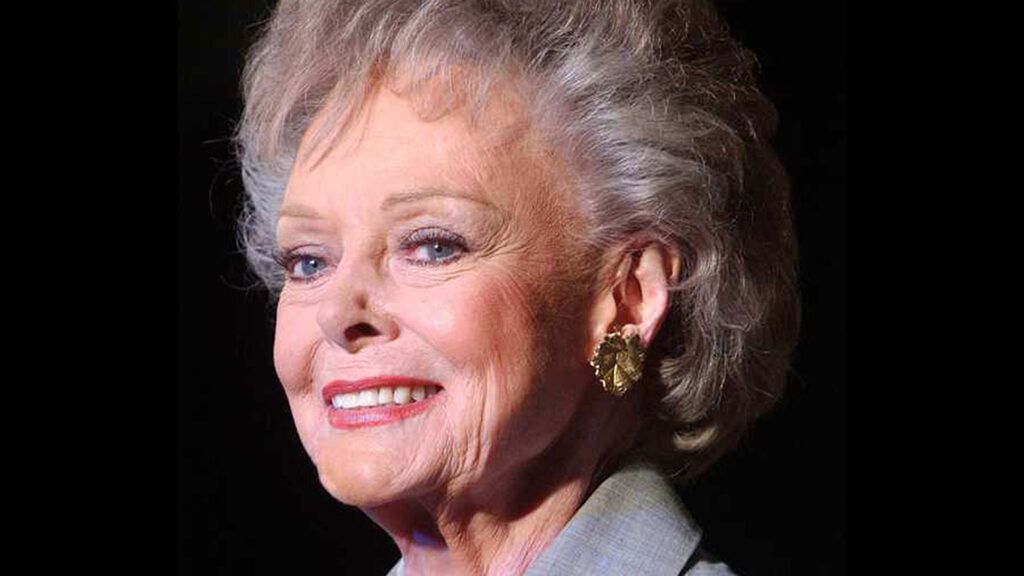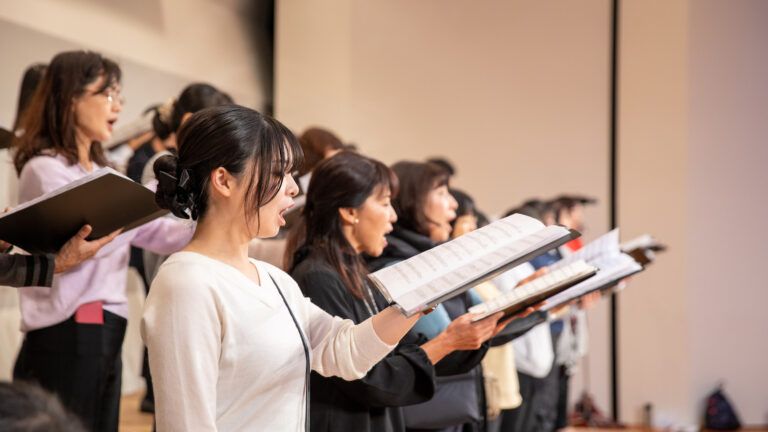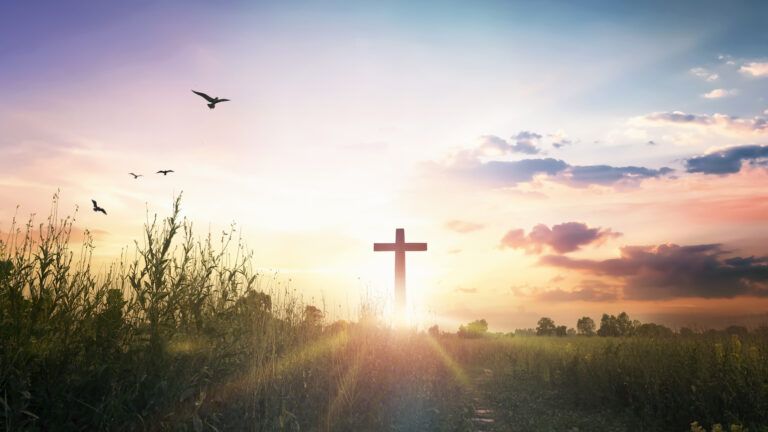Actress June Lockhart, who early in her career worked at Guideposts’ NYC office, celebrated her 96th birthday on June 25, 2021.
I was about four years old when my mother and father took me for a walk one morning along a rutted country lane in Canada. “Exploring,” we called it. A rugged split rail fence bordered the lane, and to our right was a blue lake surrounded by silver birch trees.
While we were walking, some birds began to warble in a tree above us, and my father looked up. Suddenly, as if the act of looking up had recalled it to mind, he lifted me onto one of the old weathered fenceposts and said:
“Junie, I’d like to teach you a special prayer.”
Then Daddy began to speak the words that I have since repeated so often. “Hail Mary,” he said, and paused. “Hail Mary, full of grace, the Lord is with thee…”
READ MORE: CAROL BURNETT ON SECRET KINDNESS
Right then and there Daddy had me memorize the prayer that meant so much to him. So it was that the first prayer I ever memorized was taught me while I was perched on a fencepost beside a rutted country lane in the middle of Canada.
Because of that childhood experience, I have always felt a naturalness about praying anywhere—even sitting on a fencepost. And I know a great many people who feel the same way: a prayer can be offered anywhere.
A doctor friend told me once that he had developed the habit of uttering quick prayers wherever he may be. He prays as he rides up an elevator to see a patient, he prays at a party for a troubled person he may talk to, he prays while waiting in his car for the light to change.
I know a cowboy actor who prays in the sawdust of a rodeo ring. He begins each performance with the silent words: “Jesus, be on my mind, on my lips and in my heart.” Consequently he dedicates his performance to Christ, though he is standing before thousands of people.
READ MORE: GENE LOCKHART ON GOD’S PRESENCE
A newspaper man once told me that some of his most earnest prayers are said amid clattering typewriters. “Whenever I have trouble getting a story underway,” he says, “I ask God’s help. Most often it happens that I am sitting in the middle of the City Room.” His prayer is for calmness and harmony.
An actress I know never begins a performance without saying a prayer and blessing herself; she stands in the wings of the stage and thanks God for a chance to do the work she likes.
So it’s obvious that people can—and do—pray wherever they find themselves. But I don’t feel that all places are really equal as places of prayer. There are some where prayer has always seemed to me more necessary and important: the home, for example.
When I was growing up, it seemed to me that our home was built of prayer. Whenever I read of children going bad, I wonder if they ever had the advantage of family prayer in their homes.
Did they say a blessing before meals? Were they taught to thank God for what they had, as well as to ask for what they wanted? Did they go to bed with prayer and wake up with it again in the morning?
These were all such an important part of our family life that I cannot imagine what it would be like to be without them.
READ MORE: AGNES MOOREHEAD ON THE BIBLE
Prayer in the home is an important stabilizer, ready to sustain us in times of difficulty, but also ready to steady us in times of good fortune.
I shall never forget a family I used to know at Lake Arrowhead, California. They seemed to derive so much enjoyment out of swimming, water skiing, speedboat racing and such that I found myself drawn to them.
One day I was invited to their home for lunch. I was quite impressed by the natural way everyone bowed his head and said grace. I discovered that the family belonged to the Seventh Day Adventist church, and that family devotions were a natural part of their family life, morning and evening.
Was anyone in this family ever likely to become a delinquent? I doubt it. I think I have never known youngsters to have a better time, and at the same time I think I’ve never known youngsters to be better behaved.
But important as the home is as a setting for prayer, I was still a child when I began to notice that there is another place so special, so set apart as a center of prayer that it stands in a class all by itself.
And that place is church.
While I was growing up I observed that many of the people I admired were not quite satisfied with their prayer lives unless they included regular prayers in a church.
A neighbor of ours, a housewife, used to put in a long day cleaning, sewing, cooking and doing dishes. When her dinner chores were through, I’m sure she’d have liked nothing better than to sit down and relax for a while.
Instead, several nights a week, she put on a clean dress, combed her hair, and took the crosstown bus over to church to attend a prayer meeting.
A business friend of mine—a successful advertising executive—spends part of his lunch hour every day getting to and from a place where he can pray. No matter how pressing his appointments, he takes the time to walk five blocks to his synagogue so that he can be inside a house of worship when he prays.
I was curious to know why these people felt it was so important to be in a special place when they prayed.
Then one day I learned that my own father felt this way, too. Even when he was in the middle of a picture, though tired and hungry and anxious to see his family at the end of a day, he always drove by our church on his way home, stopped, and went inside to pray.
Daddy would admit it was quite an inconvenience; he’d admit that he could stay in his car and say the same prayers while dodging automobiles.
“But I don’t,” he said, “because I feel my prayers are more meaningful if I pray in church.” When I asked him why, he said, “Because prayer, my dear, is a religious act.”
Surprised that he should make such an obvious statement, I asked him what he meant.
“There are a lot of people who think of prayer as something apart from God,” he said. “They think of it as a kind of mental energy; I feel that prayer and God are inseparable, and that’s why I go to God’s house when I pray.”
I have come to feel exactly the same way. There is something special about a prayer offered in a sanctified place. I think one of the most beautiful stories I’ve ever heard illustrates this point.
READ MORE: DONNA REED ON FAITH DURING HARD TIMES
Several years ago while I was visiting Lake Arrowhead, the baby of some dear friends of ours was rushed to the hospital, desperately ill with a lung infection.
Everyone in the community felt a deep sense of concern, especially plump, bespectacled Marie. Marie was the housekeeper for the local parish.
When neighbors brought word to Marie that the doctors had given up hope, she burst into tears. “If only Father Luke were here,” she said, “he could do something.”
But Father Luke had recently died. For many years the pastor of the little church of Our Lady of the Lake, Father Luke had been greatly loved because of his deep concern for the needs of people. And particularly for the way he used his strong, sensitive hands to bring God’s healing power into sickness cases.
In fact, his saintliness still permeated the little church—and the community itself. So it was natural that Marie should think longingly of the priest at a time of illness.
Marie had been praying for the baby regularly at the parish house ever since he took ill. But now she felt she had to do something more—she had to go down to the church.
So Marie slipped out, walked across the lawn from the parish house to the little church. She opened the door and stepped in. Candles burned and a faint odor of incense lingered in the air. Marie saw that she was alone.
She knelt at the altar railing, and prayed for a long time. Suddenly in the deep concentration of her prayer came the visualization of a pair of hands, strong and sensitive, and cradled in the hands was a baby.
She saw it for only an instant, and then it was gone. Marie was mystified, and saddened. It seemed to her that the baby had died and that she had seen it being borne to heaven. She hurried out of the church to the house of the baby’s parents, as she wanted to offer any help that was needed.
But when Marie arrived, she was greeted not with tears, but with joyous words:
“Marie! The doctor just telephoned from the hospital. The baby’s going to he all right!”
For a moment, Marie was startled. And then a mental picture flashed through her mind…of course…the loving hands meant healing.
Why was Marie’s experience with prayer in church so much stronger than anything she had felt at home? Wasn’t it because the prayers of so many people guided by a saintly man had turned a simple building into a house of prayer?
That is what I feel, whenever I enter a church. I feel the hush of thousands of prayers steal over me. I feel the impact of the words of Christ. It is written, He said long ago, My house shall be called the house of prayer (Matthew 21:13).
For more inspiring stories, subscribe to Guideposts magazine.





